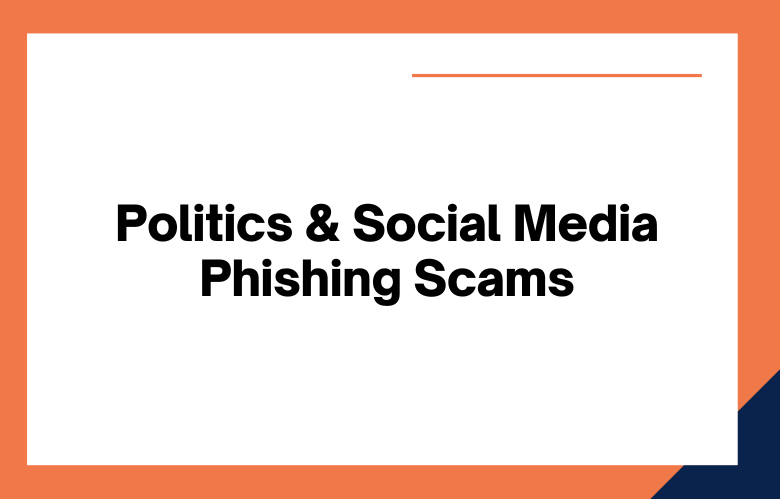Social media is a powerful tool for political candidates. It can connect with voters, raise money, and get their message out. But it can also be used by scammers to steal information or install malware on the candidate’s computer.
We’ll examine some common social media phishing scams and how to protect yourself.
You may know in the news recently – a politician falls for a social media scam and posts something they shouldn’t have. It’s embarrassing and can be costly, both politically and financially. But how do these scams work, and what can you do to protect yourself from them?
We’ll look at the typical social media phishing scams and give tips on staying safe online.
In today’s digital age, it’s more important than ever for political candidates to be aware of social media scams. Unfortunately, many candidates fall victim to these scams every election season.
Here are a few common social media phishing scams and how to avoid them.
What is a Social Media Phishing Scam?
A social media phishing scam is an online fraud that occurs when criminals pose as legitimate businesses or individuals on social media platforms to steal sensitive information from unsuspecting victims.
These scams can take many forms but typically involve the crooks creating a fake social media profile or page that looks identical to the real thing. They will then use this spoofed account to send friends or follow requests to people they think might be susceptible to their scheme.
Once the victim accepts the request, the scammers will bombard them with messages designed to trick them into handing over personal information or clicking on malicious links.
In some cases, the criminals may even go so far as to create websites that look real to imitate a trusted brand and fool their victims into giving up their login credentials.
If you ever receive a friend or follow request from someone you don’t know on social media, do your homework before accepting it. Also, be wary of any suspicious messages or requests for personal information. Remember, it probably is if something looks too good to be true!
A social media phishing scam is when a fraudster uses social media to try and extract personal information from someone. They often pose as a reputable organization or individual and trick the person into handing over sensitive information.
It is through direct messages, fake posts or comments, or by sending links to malicious websites. If you think of a social media phishing scam that targets you, report it to the relevant platform as soon as possible.
Many people are familiar with phishing scams that come through email. But did you know that scammers can also target you through social media?
Social media phishing scams are becoming increasingly common as scammers take advantage of the fact that many people use social media platforms to share personal information.
Here’s how a social media phishing scam works: the scammer creates a fake account or uses a hacked account to send messages to unsuspecting users. These messages often appear to come from a friend or someone you know and may contain links to malicious websites.
If you click on these links, you may take to a fake website that looks like a legitimate website. Once on this website, you may be asked to enter personal information, such as your login or credit card information. That’s when the scammer strikes and your personal information stole.
So, how to protect yourself from social media phishing scams? Be aware of the signs of fraud, such as unexpected messages from people you don’t know or odd messages from people you know.
If you’re unsure about a message, don’t click on any links – delete them. And never give out personal information, no matter where the news comes from.
A social media phishing scam is a fraud that occurs on social media platforms. Scammers create fake profiles or pages and use them to contact victims. They may also steal photos and personal information from real people to create fraudulent profiles. They then trick victims into giving them money or sensitive information.
How Political Candidate Falls for Common Social Media Phishing Scams
Social media is a powerful tool for political campaigns. But what happens when a candidate falls for common phishing scams?
One political candidate found out the hard way when he clicked on a malicious link that promised to reveal “dirt” on his opponents. The link took him to a fake website similar to his campaign’s authentic site.
The fake site prompted the candidate to enter his login credentials, which the attackers used to take over his account and post inflammatory messages.
The candidate was lucky to catch the attack early and quickly regain control of his account. But this incident highlights the importance of cyber security for all political campaigns.
There’s no shortage of ways for scammers to phish for information on social media. And political candidates are certainly not immune to these kinds of attacks.
Recent reports suggest many political candidates have fallen for social media phishing scams.
Well, one famous trick is to create a fake social media profile and reach out to the candidate under the guise of being a fan or supporter.
Once the scammer has gained the candidate’s trust, they can ask for sensitive information like passwords or financial details.
It is just one example of how scammers prey on political candidates on social media. So it’s essential for everyone – especially those running for office – to safeguard their online information.
A political candidate falls for a familiar social media phishing scam and loses important campaign data.
The candidate isn’t the only one who falls for the scam, as many voters also click on the malicious link.
Campaign data. The voter’s trust is essential to the candidate, so falling for a phishing scam can be costly.
The candidate learns their lesson and educates their team on how to spot phishing scams in the future.
What is a Phishing Scam, and How does it Work?
A phishing scam is an attempt by a malicious actor to Secure personal information or data by masquerading as a trustworthy entity. Phishing occurs when an attacker sends a mass email that looks like it comes from A legitimate source.
The email usually contains a link that leads to A spoofed website that looks identical to the real thing. When unsuspecting victims enter their login credentials on the site, the attacker has all information for identity theft or other financial crimes.
A phishing scam is an online fraud that seeks to steal personal information. It is done by sending emails that appear to be from a legitimate source, such as your bank or another service you use, and tricking you into clicking on a link or attachment. The goal is to infect your computer with malware or redirect you to a fake website where you will enter your personal information to commit identity theft.
A phishing scam is an online fraud that involves tricking people into divulging personal information like passwords or credit card numbers. Scammers typically do this by creating fake websites that mimic the look of legitimate ones or by sending spoofed emails that appear to come from a well-known company.
Why do Scammers Often Target Political Candidates?
One reason scammers might target political candidates is because of the access they can gain to sensitive information. If a scammer can obtain confidential information about a candidate, they could use it to blackmail the candidate or damage their reputation.
Another reason scammers target political candidates is the potential for financial gain. If a scammer can convince a candidate to invest money in a fraudulent scheme, they could make a lot of money.
Scammers may target political candidates simply because of the notoriety of fooling a well-known person. By tricking a prominent politician, a scammer can gain power and satisfaction.
- Scammers target political candidates because they are easy targets.
- They are often busy and distracted, which makes it easy for scammers to take advantage of them.
- Scammers know that political candidates have access to large amounts of money, which makes them an attractive target.
There are some reasons why scammers might target political candidates.
One reason could be that the candidate might have access to large amounts of money.
Another reason could be that the candidate might have sensitive information that the scammer could use to blackmail them. Whatever the reason, it’s essential to be aware of the threat of scammers and take steps to protect yourself.
Tips for Avoiding Social Media Phishing Scams
- Don’t open emails from unknown senders.
- Use strong passwords for all of your online accounts
- Install a good antivirus program on your computer and keep it up to date
- Be careful about what information you post online
- Keep your software updated, including your operating system and web browser.
- Educate yourself about social media scams and how to protect yourself
- Don’t click social media messages that claim to offer deals or free stuff
- Don’t open attachments in social media messages, even if they appear to be from people you know
- Be suspicious of any social media message that asks you to share personal information
- Report any scam messages or emails to the appropriate authorities
- Don’t open attachments in social media messages, even if they seem to be from a friend
- Be careful about what information you share on social media
- Use two-factor authentication whenever possible
- Keep your computer’s security software up to date
- Install an ad blocker to reduce the chances of getting scammed online
- Report any suspicious activity or scams to the appropriate authorities
- Don’t enter your login information into any websites that look like official social media login pages
- Make sure your computer’s security software is up-to-date and active
- Only use official social media websites to access your accounts
- Be aware of what you share online – scammers may try to gain access to your personal information by posing as a friend or family member
- Report any suspicious activity or emails to the social media platform in question
- Keep your passwords confidential and change them regularly
- Don’t click on links in emails or social media messages that claim to be from a friend or company
- Don’t enter your login information into any website that looks suspicious
- Always make sure you’re on the official website of the company before entering any personal information
- Use two-factor authentication whenever possible
- Be careful about what information you share online
- Install antivirus software and keep it up to date
- Regularly check your account settings and privacy policies
- Report any scam emails or social media posts to the appropriate authorities
- Don’t open any attachments that look suspicious
- Don’t enter your login information on any websites that look illegitimate
- Make sure all of your passwords are strong and unique
- Install antivirus software on your computer
- Regularly update your operating system and web browsers
- Be vigilant about what you share online
- Report any suspicious activity to the appropriate authorities
- Don’t click on links or open attachments from people you don’t know
- Look for the lock symbol in the address bar to ensure a site is secure
- Check website URLs before typing them into your web browser
- Install antivirus software on the computer and keep it up-to-date
- Review your social media privacy settings
- Report any suspicious activity to the appropriate authorities
- Don’t click on links in social media messages that look suspicious
- Don’t open attachments in social media messages, even if they appear to be from someone you know
- Don’t enter the login information to any website that is not the official login page for that site
- Install antivirus software and keep it up to date
- Make sure your computer’s operating system is up to date
- Keep your browser plugins up to date
- Don’t click on links in social media posts that look suspicious
- Be careful about what information you share on social media
- Install antivirus software on your computer
- Keep your operating system and software up to date
- Back up your data regularly
- Don’t open attachments or download files from suspicious emails
- Don’t enter your login information into any website that doesn’t seem trustworthy
- Use a strong password and change it often
- Review your privacy settings for all of your social media accounts
- Report any suspicious activity to the appropriate authorities
The Results of Falling for a Phishing Scam
- Your personal information, including your name, address, social security number, and bank account information, could be stolen.
- You could lose money if you fall for a scam that asks you to send money or provide credit card information.
- Your computer could be infected with malware if you open an email that looks like a legitimate company but is actually from a scammer.
- You could be scammed again if you don’t learn how to protect yourself from phishing.
- You could lose money in a scammer’s fake investment scheme
- You might give away your login credentials to a hacker who can then access all of your accounts
- Criminals could use your identity to commit crimes or fraud
- You could lose money if you fall for a scam and give away your bank account or credit card information
- Your computer could infect with malware that can track your keystrokes or steal your passwords
- You could become the victim of identity theft
- Your email account could be hacked and used to send spam messages to all of your contacts.
- You could lose access to all your online accounts, including email and social media.
- You could be scammed out of a lot of money.
- You could for a phishing scam targeting your company.
- You might be in legal trouble giving away your personal information, including your name, address, and credit card number.
- Your computer might get infected with a virus that can steal your passwords or other sensitive information.
- You might lose money because the scammer convinced you to send them money through an untraceable payment method like Bitcoin.
- You could lose money if you fall for a scam that asks you to send money somewhere.
- Your computer can infect with malware that can steal passwords or track keystrokes.
- You could be scammed by someone you thought was a friend or family member.
- Your email account could be hacked and used to send spam to all of your contacts.
- You could lose money if you fall for a scam and give away your credit card or bank account information.
- Your email could be hacked, giving the scammers access to all your contacts.
- You could become the victim of identity theft.
- You could be blocklisted by online merchants, making it difficult to make online purchases in the future.
- You could be scammed out of your hard-earned money
- You could end up in legal trouble if you fall for a phishing scam
- You might give away your personal information, including your name, address, and credit card number
- Your computer might get infected with a virus
- You might lose money if you fall for a scam that asks you to send money or buy something.
- You might give away your personal information, such as your name, address, and credit card number.
- Your computer could get a virus that can steal your passwords or other sensitive information.
- You might lose money if you fall for a scam and buy something that’s not real.
- Your email account could be hacked, giving the scammer access to all your contacts.
- You might be embarrassed if friends or family find out you fell for a scam.
Conclusion
As we move into the election season, it is more important than ever for political candidates and their staff to be aware of social media phishing scams. These scams are designed to steal personal information, such as passwords or login credentials.
Cybercriminals get more sophisticated in their tactics, so you must protect yourself and your campaign from falling victim to these schemes.
Contact us today if you want assistance protecting your online presence and campaign data. We have experience helping organizations secure their networks and protect their data from cyberattacks.











